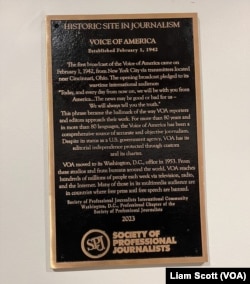A plaque honoring Voice of America’s headquarters in Washington as a historic site in journalism was unveiled Thursday, with current and former newsroom leaders present to affirm the importance of the outlet’s editorial independence.
The Society of Professional Journalists, or SPJ, designated VOA’s Washington headquarters as a historic journalism site in 2022 and formally handed over the plaque on Thursday.
“We chose VOA because of its long history of ethical and independent journalism,” Dan Kubiske, a board member of SPJ’s Washington chapter, told VOA at the event.
This is the eighth time SPJ has honored a historic journalism site in the Washington area, according to Kubiske.
He added that he hopes the VOA commemoration helps people “understand that VOA reporters and editors are not government hacks.”
“They are reporters and editors in the tradition of all the great reporters and editors in the country,” Kubiske continued.
Although funded by Congress, VOA and its sister outlets are editorially independent.
“For more than 80 years and in more than 80 languages, the Voice of America has been a comprehensive source of accurate and objective journalism,” the plaque reads. “Despite its status as a U.S. government agency, VOA has its editorial independence protected through custom and its charter.”
Following the plaque’s unveiling, current and former newsroom leaders gathered to discuss the highlights and challenges they experienced during their various tenures.
For David Ensor, a veteran journalist who led VOA from 2011 to 2015, a particularly proud moment was when he helped VOA establish a local language service in Mali amid rising terrorist activity in the country’s north.
“One of my favorite moments as director was driving through the streets of the capital city in the evening,” Ensor said. “And you could hear Voice of America playing in every house in the entire city.”
Political challenges facing VOA over the years also featured in the panel’s discussion.
“Talking about being beaten around politically, I don’t think there’s been any era where that hasn’t happened,” said Amanda Bennett, CEO of VOA’s parent organization, the U.S. Agency for Global Media, and a former VOA director.
“I think that’s the nature of the game when you’re a free press,” she added during the panel discussion.
Bennett served as VOA’s director from 2016 until 2020, when she resigned following the congressional confirmation of conservative activist Michael Pack to lead the U.S. Agency for Global Media, or USAGM. That came after then-President Donald Trump spent months condemning VOA’s coverage.
A federal investigation later found that Pack repeatedly abused power and engaged in severe mismanagement. Pack targeted staffers perceived as critical of Trump and interfered in the outlet’s journalistic independence.
Sanford Ungar, who led VOA from 1999 to 2001, warned that tough times could be ahead for the international broadcaster.
“The next 10 months are very, very important for the future life of VOA,” said Ungar, who now runs the Free Speech Project at Georgetown University.
“There’s a strong possibility that VOA in particular, but perhaps all of USAGM, will be under siege, once again, after the election in November,” Ungar continued.
Bennett said fortifying VOA’s independence is a priority.
“Every day, no matter what we know is up ahead, we should be strengthening and practicing that independence,” she said. “It is the fundamental, existential fact of our existence.”

